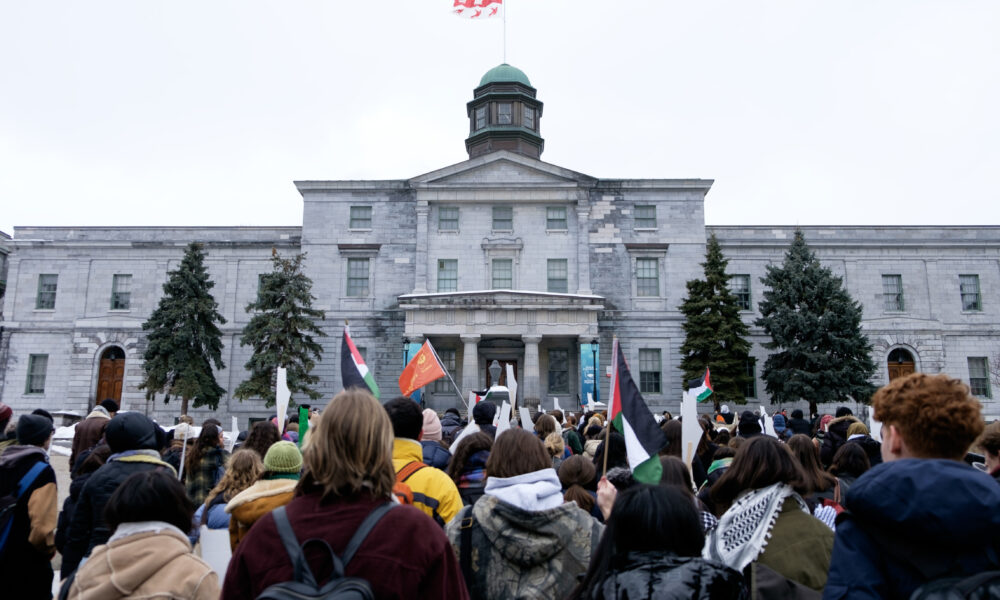On March 28, McGill’s Provost and Executive Vice-President (Academic) informed the campus community via email that “some protestors and picketers again attempted to disrupt University activities” and that “police made at least one arrest and the university has chosen to press charges.”
Reports suggest the disruptive actions were carried out in solidarity with McGill students engaged in a protracted hunger strike over the university’s position on the violence currently being inflicted on people in Gaza.
Addressing “those who choose to engage in protests or pickets going forward,” the Provost warned: “You have a range of legitimate, legal, peaceful options for raising awareness of your views,” and threatened that “where other options are chosen instead, consequences will follow.”
What kinds of “legitimate, legal, peaceful options” does McGill’s governance structure make available for the specific concerns expressed by these protestors?
These courageous activists are not seeking simply to “raise awareness” of their views (state-sanctioned killing and starvation of innocents because of their ethnicity and where they live is not something about which one has “views”). They are, instead, trying to persuade the Board of Governors to withdraw McGill’s investments from companies they believe “directly or indirectly support Israel’s apartheid state and its ongoing genocide against Palestinians” and to cut McGill’s ties with the Israeli state and Israeli universities.
Under the circumstances, this is not an outrageous request. Yet the university’s own mechanism for receiving expressions of concern about its investments all but guarantees the Board will never consider it.
The university’s investments are subject to review by the Committee on Sustainability and Social Responsibility (CSSR), which is mandated to ensure McGill does not invest in companies whose activities result in “grave injurious impact,” including those which “violate or frustrate the enforcement of rules of domestic or international law intended to protect individuals against deprivation of health, safety, or basic freedoms, or to protect the natural environment.”
Is petitioning the CSSR one of the “legitimate, legal, peaceful options” available to the hunger strikers and their supporters (1200 signatures, and counting), an institutional process through which they can express concerns about the role played by companies in which McGill invests in the grave injuries being committed against the people of Gaza and the West Bank?
As it turns out, not really.
An August 2023 revision to the CSSR’s terms of reference stipulated that “a legal person [i.e., a corporation] shall not be deemed to cause ‘social injury’ simply because it does business with other legal persons which are themselves engaged in socially injurious activities.”
Under this provision, if a group of McGill students discovered the university was investing in a company that provided support to Hamas in its horrific October 7 attack on Israeli citizens, they would have a hard time bringing this before the Board as a potential violation of the university’s policy on socially responsible investing.
Sadly, hypothetical examples are not necessary. We have before us an actual case in which a significant portion of the McGill community believes that companies in which the university invests are profiting from activities implicated in the killing, maiming, forced starvation, and displacement of thousands of innocent people in Gaza. Consideration of these claims and related evidence is deliberately undermined by the rules of the very body that supposedly exists to decide such grave questions on behalf of the university.
The option to express these concerns by “legitimate, legal, peaceful” means in a forum where this could have real impact has been effectively foreclosed. As a result, we are left with the heartbreaking spectacle of McGill students starving themselves and getting arrested, just to get the university’s attention.
The communique sent to the McGill community referred to McGill’s “//esprit rassembleur//,” a recent coinage intended to evoke a special McGillness supposedly at risk due to the unruly activities of human rights advocates, trade unionists, and the Gouvernement du Québec. But if there is a threat to McGill’s //esprit rassembleur//, it is not the alleged excesses of passionate protest, labour organization, and cynical public policy. It is university governance procedures that leave serious people without genuine options for bringing legitimate concerns to forums where consequential decisions are being made.
If the university’s administration is truly concerned about the political climate on campus, it could start by asking the Board to rescind its prejudicial definition of social injury so that the options available to people acting in good faith are real, instead of imaginary.







